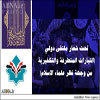
Author
Shahroz Ebrahimi (Assistant Professor and member of Political Sciences academic boards in University of Esfahan)
Aliasghar Sotodeh (Ph.D student in International Relations from University of Gilan)
Abstract
Islamism is a process which has been considered as the most central changes in Islamic world during a few recent decades enjoying more power after Iran Islamic Revolution in 1978 to come up with a pattern of political-religion system against western liberal democracy. Having recent changes in Middle East recently (Arabic Revolutions), political system of Islamic Republic of Iran found an opportunity to be a desirable alternative for autocratic despot systems which are dependant on the west. However; this opportunity faced many challenges as takfiri movement proceeded and was supported spiritually and materially by regional and super regional powers. In this sense; this study focuses on the dangers of current challenges and presents strategies to counter these challenges.
Radical questions of this research are: how takfiri movement's progress can have deterrent effect on Islamism growth in region and Islamic world? Growth of takfiri movements can bring challenge for Islamism from two substantial aspects: 1- making Islamic communities polarized thanks to contrast between Shia and Sunni. 2- Decreasing Islamism attraction as an alternative for liberal democracy, influenced by bigoted and violent conducts of Salafi-Takfiri groups.
In this study an analytical-descriptive method of research is used and library and internet database has been used to collect data. To remove challenges caused by Takfiri Movements on the way of Islamism, two strategies have been introduced as followings: one is diplomacy of widespread relations amongst Islamic groups and countries and the other is military, decisive opposition to the progress of Takfiri Movements.
Keywords: Takfiri Movements, Regional Powers, World Powers, Islamic Revolution, Political Islam
source : www.makhateraltakfir.com













